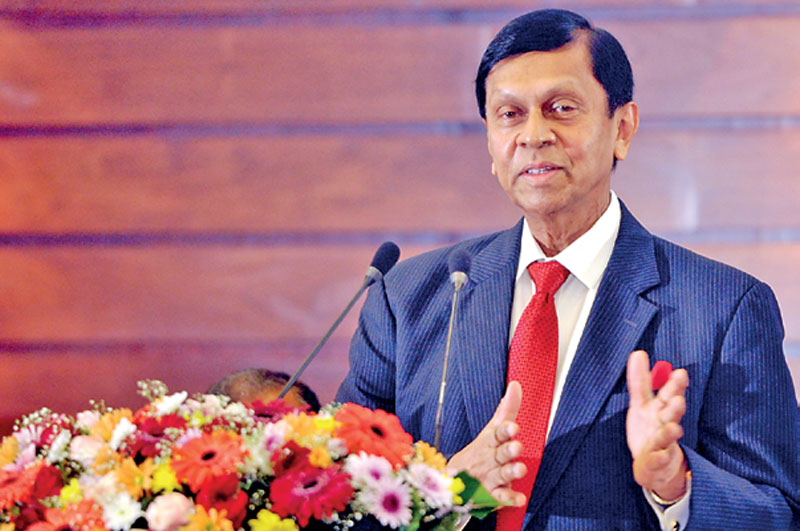Wednesday Feb 18, 2026
Wednesday Feb 18, 2026
Saturday, 9 October 2021 00:37 - - {{hitsCtrl.values.hits}}

Central Bank Governor Nivard Cabraal
Global giant Citi has said it remains credit neutral on Sri Lanka, describing downside risks as high despite the measures outlined in the Central Bank’s short-term Road Map.
“We remain neutral on the credit,” said Citi in its latest view point on Sri Lanka economics and strategy and noted: “We view downside risks as high, especially as there is a non-negligible probability that Sri Lanka may attempt to restructure without the IMF. We think the bonds might offer better value post a potential restructuring.”
Citi noted that the CBSL Governor presented a six-month roadmap on 1 October to bolster confidence among stakeholders and ease USD and goods hoarding as well as parallel FX-market conversions, which are worsening macro problems.
“The Road Map announcement provides more detailed context for investors and stakeholders. But we think the plan contains somewhat less clarity and longevity than some investors sought,” Citi said.
Giving its take on the country’s debt restructuring scenarios, Citi said Sri Lanka was facing multiple possible outcomes over the coming months as it seeks to resolve its debt challenges.
In its latest analysis, Citi explores some of these scenarios, including the possibility of a future default on private creditors, and the potential contours of such an outcome.
In its analysis Citi explores the outlook for Sri Lanka’s debt resolution dilemmas, and in particular a scenario in which Sri Lanka eventually suspends repayment of sovereign debt in 2022 as it seeks to negotiate an IMF program.
“We believe the possibility of a potential default being delayed until mid-2022 has risen following recent statements by top officials. But with gross reserves expected to fall below $ 3 b by year-end (usable reserves closer to $ 2 b), a worsening dollar shortage is likely to lead to more adverse macroeconomic outcomes, and thus, we think suspending repayment as officials finalise a restructuring deal could be one likely outcome,” Citi said.
“However, this is ultimately a political decision,” said Citi, adding that without extraordinary financing, the Government may face significant challenges in finding resources to repay the July 2022 bond.
It said recent policy actions and statements suggest strong resistance to the likely terms of an IMF deal, with policymakers probably preferring a homegrown policy approach.
“We think this raises the odds that the January 2022 bond may still get repaid. However, without extraordinary financing, we do not think the Government will have the resources to service the July 2022 bond, and we eventually expect a debt restructuring under an IMF program,” Citi said.
Insisting it remains neutral on the credit, Citi said as Sri Lankan authorities seek to stabilise debt/GDP and reduce the debt burden, “we estimate they may face pressure to haircut coupon by at least 42-48%, with notional haircut of at least 10%, and maturity extension that ranges from seven years for short-duration bonds to 20 years for longer-maturity bonds.”
Assuming 8.5% exit yield (consistent with a B- rated credit), Citi estimates ‘recovery value’ on the dollar bonds in such a scenario could range between 55pts for long-end to 65pts for short-end.
“If we were to see higher exit yields, bond prices could easily trade below those levels. We view downside risks as high, especially as there is a non-negligible probability that Sri Lanka may attempt to restructure without the IMF. We think the bonds might offer better value post a potential restructuring,” Citi added.